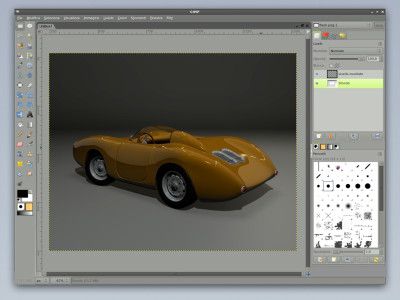- Qualcomm Launches Snapdragon 4 Gen 2 Mobile Platform
- AMD Launches Ryzen PRO 7000 Series Mobile & Desktop Platform
- Intel Launches Sleek Single-Slot Arc Pro A60 Workstation Graphics Card
- NVIDIA Announces Latest Ada Lovelace Additions: GeForce RTX 4060 Ti & RTX 4060
- Maxon Redshift With AMD Radeon GPU Rendering Support Now Available
GIMP 2.8 Brings a Streamlined Interface (a la Photoshop)
Artists don’t have to look too far to find a good image manipulation tool. More often than not, Adobe’s Photoshop is right at the top of their list. But the problem is obvious… the cost. At $700, it’s not exactly welcoming to the novice, or even those who are professional but quite haven’t made a business out of it. There’s always the much lesser-expensive Photoshop Elements, and that’s a great choice, but it’s not exactly geared towards savvy artists.
Of course, free tends to be a preferred option by many, and that’s where applications like GIMP come in. One of the primary reasons for this may be in the fact that it’s one of the oldest – it’s been around since 1996. It’s continued to get better and better over time, and the future for the application looks bright. In version 2.8, the developers have really listened to the application’s users, and as a result, it may be taken more seriously by the bulk of the artists out there.
If there’s just one feature to be pointed out about 2.8, it’s something that many people have wanted for a while… a UI style similar to Photoshop. Don’t worry… if you happen to dislike Photoshop’s UI, the option to revert to the classic style will remain. I, for one, am really looking forward to this, though, because I’ve always despised having separate windows open for a single application. This was made even worse with version 2.6, when two windows would appear in the task bar at all times (the tools and main application). It’s this reason alone that I’ve stuck with 2.4.
Like Photoshop, the toolbox would be found at the left side of the entire application, with image-specific options on the right, such as layers, paintbrushes, et cetera. So unlike Photoshop, which stores a fair amount of options at the top under the menu, GIMP 2.8 is focusing more on the left and right sides (which is typically fine given the wide resolutions of today).
You can read a lot more about the upcoming version at the link below. The release is unknown, and I can’t even guess as to a date, but if I had to, I’d guesstimate ~4 – 6 months (don’t quote me).

The high number of contributions in the singleâ€window category confirms that this is a major issue where action needs to be taken. The many forms the contributions take shows us that a measure of flexibility and configurability is needed. Next, I reminded everyone that it is a fifty–fifty world: about 50% of GIMP users love the multiâ€window interface of today and do not want to lose it, about 50% of GIMP users would love to move to a singleâ€window interface.
| Source: m+mi works |
Discuss: Comment Thread
|




